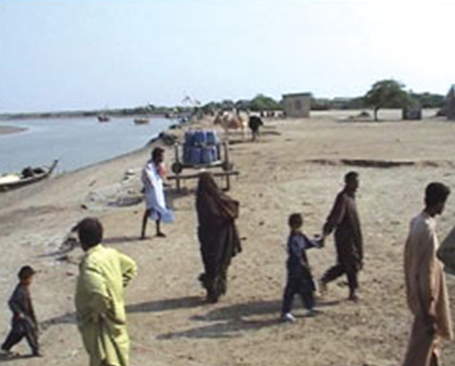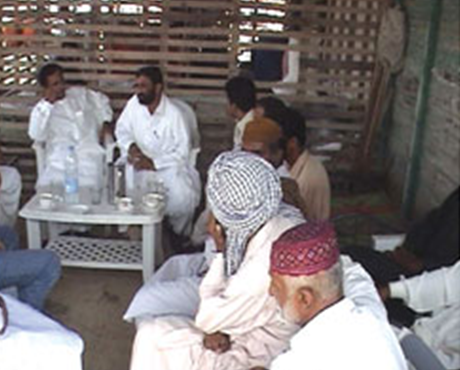Sokhi Bunder
This is a collection of articles archived for the excellence of their content. Readers will be able to edit existing articles and post new articles directly |
Sokhi Bunder
The lost land
By Imdad Soomro
Tale of a place in Sindh that has a glorious past but a woeful present
Sokhi Bunder is a town in Sindh where one can spot 300 huts made of wood. Sad as it may sound, there are no civic amenities available to its inhabitants. They cut a sorry picture since most of them have come from distant shores and have had a brilliant past.
Near this town is the island of Kharochan. I had heard stories of past glory and present pains related to this area, and a few days ago I finally got an opportunity to see them first-hand.
Yusif, an octogenarian, used to be an employee of the customs department in Sokhi Bundar, which had been inundated with seawater, recalls the life he lived in the city of Sokhi Bunder: “There were bazaars and buildings, festivals and carnivals, there used to be a lot of fun,” he said. “Now it is a vanished city. No signs of life can now be witnessed here.” He was then interrupted by another old man with more interesting things to tell.
But their elders didn’t have any bitter memories to warn them about. “There were paddy fields and people used to export rice,” said Ahmed Khatti, 53, who now owns a little shop. He displayed a bitter expression when he was asked by this scribe: “Why don’t you bid farewell to Kharochan?” Taking a deep breath he said, “My homeland is a tranquil, peaceful place. Here life doesn’t run away, it moves slowly.”
Fifty years ago, it is said, Kharochan was a bustling town near the Indus Delta with a population of a few thousand. There's a harbour, Sokhi Bandar, near Kharochan. The meaning of the name is “port of the prosperous”. It is believed that from here in the golden days people exported silk, rice and wood to countries in the Persian Gulf and in South-East Asia.
The port of Sokhi Bandar has now disappeared into the sea and the groundwater has turned saline in large parts of the delta. A white crust of salt covers the earth and the fields that used to be fertile have now turned into a parched land. More than half of the region's population lives below the poverty line and thousands of people have left their homes in search of a better living.
There were many sea ports in the delta before the irrigation system was put in place. “The Kotri Barrage has reduced the Indus water which flooded the delta belt before it was constructed on the Indus,” said Haji Ahmed Mughan, UC nazim. People believe that it is because of the shortage of Indus water going downstream that things have gone bad.
Dedul Badar, Shah Bandar, Jakhi bandar, Dharaj Bandar, Vikar bandar, Keti Bandarand and Sokhi Bandar used to be the main sources of trade in the past. When these ports stopped functioning, people started to migrate to other parts of the country. Those who didn't leave their ancestral homes now lead a terrible life.
There was a time when the people living in wooden-huts were the 'rich landlords' of these port areas. But once the sea turned their fertile lands into a saline desert, they lost their well being. These days the main source of their livelihood is fishing.
There are no schools in the area. “We have only one primary school without a proper building and there is only one teacher in that school … and even he is found absent from school oftentimes,” said Arab Samo.
There's no health unit centre here either. Only a dispensary that scarcely has medicines and a doctor can be seen attending to the sick. “Snake-bite cases happen here in the summer,” said a villager. “And it is very hard to reach the hospital from here.” Reason being there is no public transport facility available to the residents of the area. People usually opt for a boat ride from Kharochan to Patan (banks of the Indus). It costs 10 rupees per person.
The water that inundated the land here seems to pose a similar threat to Thatta and Badin districts, something that our rulers and elected representatives tend to ignore.
According to a survey, 53 per cent people live below the poverty line in the Thatta district and 55 per cent in the Badin district. These are two of the poorest districts in the country. The literacy rate is estimated to be 16 per cent in both districts. When I visited an NCHD-supported primary school in Mirpur Sakro taulka, I discovered that there were only two rooms and three teachers for 141 students in the facility.
The people here don't complain about any shortcoming. “Why cry when there's no one who cares for us,” Peeral said. The residents of Kharochan, however, demand a protection bund around the town so that they can store rainwater or the water from the Indus in July-August. “This year the water from the Indus flowed down for two-and-a-half months. We are thankful to our Lord,” said Sikandar Shah, a social worker.
During the British rule, Keti Bandar was a metropolitan city. “After the Karachi port came into being, Keti Bandar was left unattended and is now in ruins,” said Haji Mohammad Khaskheli.
It is indeed saddening to note that the areas that represent our glorious past are now blatantly ignored by the people at the helm of affairs.


